THE CARIBBEAN IS MAKING STRIDES ON THE SDGS





The Economic Commission for Latin America and the Caribbean (ECLAC) is one of five regional commissions of the United Nations Economic and Social Council (ECOSOC). It was established in 1948 to support Latin American governments in the economic and social development of that region. Subsequently, in 1966, the Commission (ECLA, at that time) established the subregional headquarters for the Caribbean in Port of Spain to serve all countries of the insular Caribbean, as well as Belize, Guyana and Suriname, making it the largest United Nations body in the subregion.
At its sixteenth session in 1975, the Commission agreed to create the Caribbean Development and Cooperation Committee (CDCC) as a permanent subsidiary body, which would function within the ECLA structure to promote development cooperation among Caribbean countries. Secretariat services to the CDCC would be provided by the subregional headquarters for the Caribbean. Nine years later, the Commission’s widened role was officially acknowledged when the Economic Commission for Latin America (ECLA) modified its title to the Economic Commission for Latin America and the Caribbean (ECLAC).
The ECLAC subregional headquarters for the Caribbean (ECLAC/CDCC secretariat) functions as a subregional think-tank and facilitates increased contact and cooperation among its membership. Complementing the ECLAC/CDCC work programme framework, are the broader directives issued by the United Nations General Assembly when in session, which constitute the Organisation’s mandate. At present, the overarching articulation of this mandate is the United Nations Sustainable Development Goals.
Towards meeting these objectives, the Secretariat conducts research; provides technical advice to governments upon request; organizes intergovernmental and expert group meetings; helps to formulate and articulate a regional perspective within global forums; and introduces global concerns at the regional and subregional levels.
Areas of specialization include trade, statistics, social development, science and technology, and sustainable development, while actual operational activities extend to economic and development planning, demography, economic surveys, assessment of the socio-economic impacts of natural disasters, climate change, data collection and analysis, training, and assistance with the management of national economies.
The ECLAC subregional headquarters for the Caribbean also functions as the Secretariat for coordinating the implementation of the Programme of Action for the Sustainable Development of Small Island Developing States. The scope of ECLAC/CDCC activities is documented in the wide range of publications produced by the subregional headquarters in Port of Spain.
Director’s Desk:
The Caribbean is making strides on the SDGs
Stakeholder Consultations for the Voluntary National Reviews: A Vehicle for Increasing Awareness of, and Commitment to the SDGs
Caribbean Youth Action for a Sustainable Future
“Big Ships Turn Slow”
Importance of institutions in promoting sustainable development and building resilience in the Caribbean
Recent and upcoming meetings
List of Recent ECLAC Documents and Publications
Antigua and Barbuda
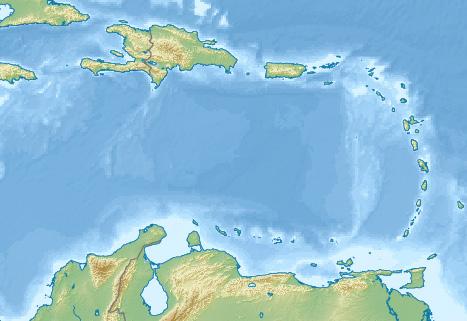
The Bahamas
Barbados
Belize
Cuba
Dominica
Dominican Republic
Grenada
Guyana
Haiti Jamaica
Saint Kitts and Nevis
Saint Lucia Saint Vincent and the Grenadines
Suriname
Trinidad and Tobago
Anguilla Aruba
British Virgin Islands Cayman Islands
Curaçao
Guadeloupe
Martinique Montserrat
Puerto Rico
Sint Maarten
Turks and Caicos Islands
United States Virgin Islands
FOCUS: ECLAC in the Caribbean is a publication of the Economic Commission for Latin America and the Caribbean (ECLAC) subregional headquarters for the Caribbean/Caribbean Development and Cooperation Committee (CDCC).
EDITORIAL TEAM:
Director
Diane Quarless, ECLAC Editor
Johann Brathwaite, ECLAC Copy Editor
Denise Balgobin, ECLAC Coordinator
Abdullahi Abdulkadri, ECLAC Design Blaine Marcano, ECLAC
Produced by ECLAC
ECLAC Subregional Headquarters for the Caribbean PO Box 1113, Port of Spain, Trinidad and Tobago
Tel: (868) 224-8000
E-mail: spou-pos@eclac.org Website: www.eclac.org/portofspain
Dominica, Grenada, Saint Kitts and Nevis, and Suriname will present a VNR for the first time. They will be joined by Jamaica, reporting for the second time. Except for Haiti, at the conclusion of this year’s HLPF, all Caribbean Development and Cooperation Committee (CDCC) member states will have presented at least one VNR. This is noteworthy, given the initially slow pace of implementation of the 2030 Agenda for Sustainable Development in the subregion.
Out of concern for the lack of evidence of tangible progress in national ownership of the 2030 Agenda, and the SDGs in the Caribbean during the early months following its adoption, ECLAC Caribbean organized the first subregional meeting on the SDGs in Kingston, Jamaica in February 2017. At that meeting, member States identified key obstacles to effective implementation of the SDGs, including the absence or inadequacy of institutional frameworks for national ownership of the global agenda; limited capacity for planning and implementing comprehensive and integrated national development plans; and a dearth of data to inform sustainable national development. Since then, ECLAC has committed efforts and resources to address these and other obstacles, which were thwarting the progress of Caribbean countries in attaining the SDGs. Five years on, the Commission’s dedication to this effort and the demonstrated commitment of the member States have yielded positive outcomes.
Over the 2018-2021 period, ECLAC implemented a German Development Corporation (GIZ)- funded project on Planning for the implementation of the 2030 Agenda for sustainable development in the Caribbean, and a Development Account 11th tranche project on Strengthening institutional frameworks in
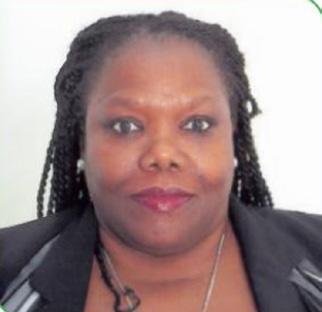
The 2022 High Level Political Forum on Sustainable Development (HLPF) heralds a significant milestone for the Caribbean. In July, five Caribbean countries will each present their Voluntary National Review (VNR) of progress made towards achieving the objectives of Agenda 2030, the priorities identified, and challenges encountered in that effort. This will be the first time that so many Caribbean countries present their VNRs during a single session of the annual global voluntary review of implementation of the Sustainable Development Goals (SDGs).
the Caribbean for an integrative approach to implement the 2030 Agenda and the SIDS Sustainable Development Agenda. These two projects focused primarily on addressing the obstacles to SDG implementation identified by member States, and are credited with raising national awareness and ownership of the 2030 Agenda and the SDGs, strengthening national capacity for long-term national development planning and evidencebased process, supporting countries in establishing national institutional framework for SDG implementation, and enhancing the statistical capacity of countries for national development planning and SDG reporting.

In addition, ECLAC has facilitated peerlearning among Caribbean countries and between Latin America and Caribbean countries, regarding best practices in the preparation of the VNR through ECLAC’s Community of Practice on Voluntary National Reviews for Latin America and Caribbean countries. This group meets monthly to address important topics relating to the SDGs and pays particular focus on positioning countries to be better prepared for presenting their VNR.
However, the cumulative effect of these and other activities championed by ECLAC and in collaboration with the UN system in the Caribbean, has gone beyond positioning countries of the subregion to implement the 2030 Agenda and report on the SDGs. It has engendered active citizen and stakeholder participation in the SDGs and national sustainable development planning processes.
An important group of stakeholders that has shown particular interest and zeal is the youth. They have remained engaged, demanded to be included and not just listened to, and have contributed
in meaningful ways to the many dialogues on the future of their countries and the subregion. In recent years, the COVID-19 pandemic and the 2021 La Soufriere volcanic eruption in Saint Vincent and the Grenadines served to heighten attention given to the need to strengthen Caribbean resilience, even as two Caribbean countries work to finalize their new national development plans. This edition of the FOCUS magazine features articles that highlight these activities. The importance of stakeholder engagement in the successful preparation of VNRs, underscoring the need for a participatory approach to such national consultations, is discussed in the first article. The next article showcases how Caribbean youth are poised to make an impactful contribution to sustainable development in the subregion. An article giving an account of Caribbean youth preparation for this year’s ECOSOC Youth Forum follows. The final article advances a case for promoting and advancing the SDGs, by making Caribbean countries more resilient to the impact of disasters and climate change.
With increased national ownership of the global Agenda, the Caribbean is now better positioned to implement the SDGs. National, regional, and international efforts therefore should take full advantage of this momentum in order to accelerate the achievement of the SDG targets, particularly since the Caribbean is still lagging on a number of them. We have work to do yet!

Akey activity undertaken by countries as part of their VNR is stakeholder consultation. These consultations are a way of getting key stakeholders that represent diverse subpopulations (see Figure 1) involved, to ensure that no one is left behind. More importantly, stakeholder consultation facilitates national ownership of the 2030 Agenda and serves as a rich source of qualitative data used to inform the VNR.
For recent VNRs, prepared in the context where social distancing and virtual meetings have become the norm, countries have used other means including technology to access the viewpoints and experiences of all stakeholder groups and persons of interest.
. This is achieved by using inclusive and participatory approaches that include:
• Virtual Meetings. These focus on building greater levels of knowledge and awareness of the SDGs among stakeholders, allowing stakeholders to better understand the purpose of the VNR and how they can contribute to it, and how their work can be included in it. During these meetings the role of the VNR in monitoring and evaluating development progress is also discussed. This is not limited to consideration of progress being made by government, but also includes the accomplishments of non-state actors. These virtual meetings serve as a means of collectively engaging stakeholders to determine national best practice that could be shared with the rest of the world.
• Administering “SDG/VNR”
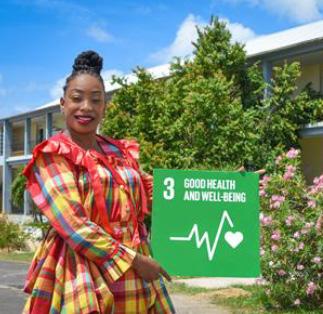 Elizabeth Emanuel *
Elizabeth Emanuel *
The Voluntary National Review (VNR) is an important tool, used globally to demonstrate how countries are progressing toward achieving the Sustainable Development Goals (SDGs). The VNRs allow countries to share successes, challenges, and lessons learned with a view to accelerating the implementation of the 2030 Agenda.
Figure 1: The range of stakeholders engaged in the VNR preparation processes
questionnaires to stakeholders. In many of the stakeholder engagements, new data sources are revealed that are useful for SDG reporting. Therefore, administering questionnaires to stakeholders provides a more efficient way of gathering information and data. The feedback from the questionnaires usually provides rich information to inform the VNR report.
Caribbean governments have also found it useful to engage stakeholders in the review of the draft VNRs. Such an opportunity for stakeholders to provide feedback ensures that there is consensus on what the country presents in their VNR at the High-level Political Forum on Sustainable Development (HLPF).
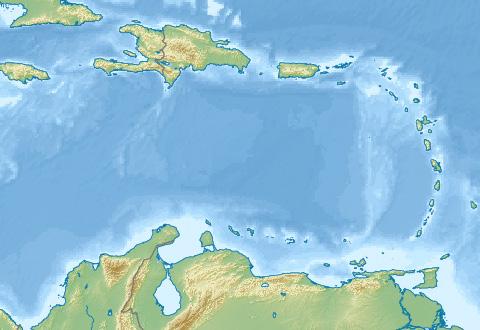
The preparation of the VNR serves as a vehicle to raise the overall awareness of the SDGs and the philosophy behind the Goals and sustainable development. It also promotes the localization of the SDGs and provides an opportunity to
showcase national documents that are aligned to the SDGs.
In all, it facilitates the implementation of the 2030 Agenda for Sustainable Development at the national level. In addition, stakeholder consultations have had other benefits, such as:
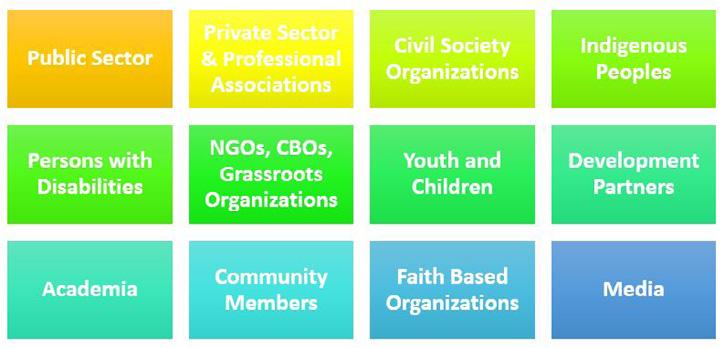
• Generating consensus or shared motivation around a country’s development and fostering higher levels of interest to participate in the implementation of the SDGs
• Translating stakeholder knowledge, views, and expertise into the VNR report, while at the same time enabling stakeholders to achieve consensus on their country’s development agenda, thereby creating the foundation for more effective policy development and coherence in the near term
• Allowing government stakeholders to gain new knowledge and insights from non-state actors on various projects and programmes in which they are engaged, understanding how non-state actors are contributing to the country’s development and helping them to better understand
that they too are key to the achievement of the SDGs
• Giving voice and space to all to add to the policy dialogue, creating opportunities for pooling knowledge, experience, and expertise towards defining shared solutions to a range of developmental issues affecting the country now and, in the future,
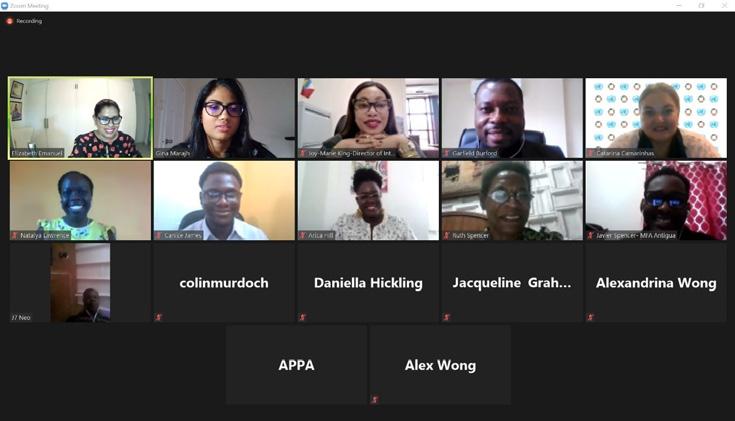
• Building collaborative partnerships and new relationships and interests that should foster higher levels of engagement
• Building credibility, trust, and ownership among stakeholders in the development process
• Engendering higher levels of stakeholder satisfaction
Through the VNR process and the public consultations, there has been an increased interest from non-state actors in the SDGs and the role that they are playing to advance the 2030 Agenda for Sustainable Development.
During consultations held in various Caribbean countries, stakeholders shared their work and their alignment with the SDGs and the SDGs targets to which they contribute. These countries have been able to showcase through their VNRs how stakeholders— in the public and private sectors, civil society, academia, and indigenous peoples (in the case of Dominica, the Kalinagos)— have been building on existing activities, adopting lessons learned and best practices and enabling the systematic implementation of the 2030 Agenda. Accordingly, the VNRs have included examples and case studies from several non-state actors.
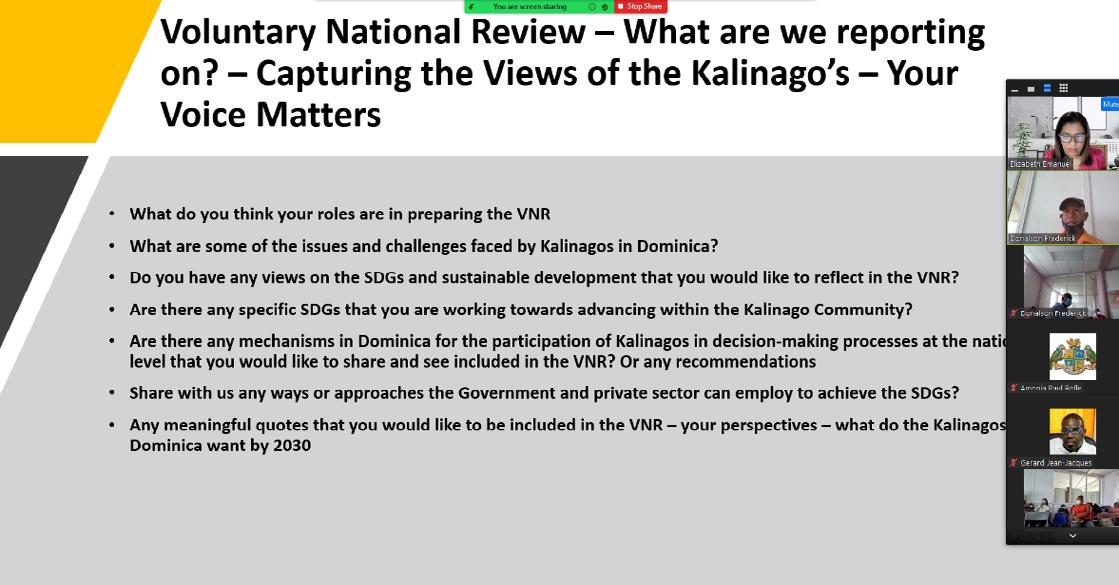
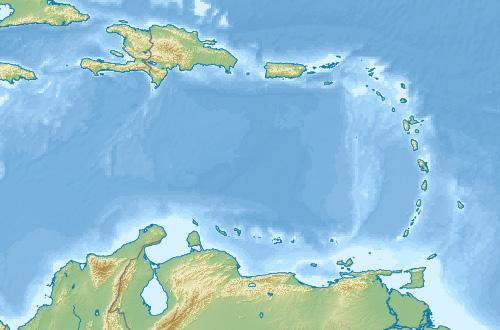
CARIBBEAN COUNTRIES CAPITALIZE ON SDG CONSULTATIONS TO BUILD PUBLIC COMMITMENT TO THE SDGSFigure 2: A Snapshot of the virtual stakeholder consultation with the Kalinagos in Domi-
*
The 2030 Agenda recognizes in several of its Goals, the centrality of the full incorporation of youth as a necessary condition to move towards more egalitarian societies on a path of sustainable development and to ensure that no one is left behind.1

Guided by the United Nations (UN) system-wide youth strategy,2 the UN has been strengthening its work for and with young people worldwide, with the main objectives of engaging, supporting, and empowering young people to put their ideas into action. To this end, young people have been meaningfully engaging with government representatives, youth delegates, and other relevant stakeholders in civil society and the private sector to shape policy recommendations, and to explore ways and means of promoting youth development and inclusion for the realization of the Decade of Action for the Sustainable Development Goals (SDGs) and other international commitments.
Over the past years, the annual Economic and Social Council (ECOSOC) Youth Forum – which contributes to the review of the 2030 Agenda, has been flagged as the largest gathering of young people at the United Nations. This year’s Youth Forum, scheduled to take place in April, addresses the theme of ECOSOC and the 2022 UN High-level Political Forum on Sustainable Development (HLPF)3 on

The Caribbean is home to more than 11 million youth, who have a central role to play in the advancement of sustainable development in the subregion. While there are still many challenges for young people to reach their maximum potential, the 2030 Agenda for Sustainable Development offers an excellent opportunity to galvanize action aimed at promoting greater inclusion of youth in all spheres.
“Building back better from COVID-19 while advancing the full implementation of the 2030 Agenda for Sustainable Development”. To be held virtually, young people would be afforded the opportunity to engage in dialogue with member States and other actors on concrete actions on how to transform the world into a fairer and more sustainable place, and to rebuild from the COVID-19 pandemic to advance towards the implementation of the Decade of Action. The Youth Forum is also set to review the progress in the achievement of five SDGs: quality education (SDG 4), gender equality (SDG 5), life below water (SDG 14), life on land (SDG 15) and partnerships for the goals (SDG 17).
The ECOSOC youth Forum facilitates regional breakout sessions for discussions on the situation regarding the pandemic and its impacts in the various regions. These regional dialogues were organized by regional commissions together with regional youth entities and partners. Towards these regional breakout sessions,4 a series of activities took place to facilitate the dialogue with and for youth in Latin America and the Caribbean to gather their opinions, expertise, and recommendations on the five SDGs under review at this year’s HLPF, while taking into consideration COVID-19 impacts.
The Economic Commission for Latin America and the Caribbean subregional
Headquarters for the Caribbean in collaboration with UN Women, UNFPA, and UNESCO as well as the Caribbean and Americas Regional Representative of the Commonwealth Youth Council and the Caribbean Regional Youth Council (CRYC), organized a series of Caribbean Youth Dialogue sessions in February 2022, where over the course of two days, young persons, youth organizations, government focal points and other youth stakeholders shared their perspectives. Participants shared their challenges, provided suggestions on how to involve young people in the COVID-19 pandemic recovery process and on how to increase partnerships for achievement of the SDGs.
The outcomes of the Caribbean Youth Dialogues fed into a Regional Youth Forum, side event that took place at the Fifth Meeting of the Forum of the Countries of Latin America and the Caribbean on Sustainable Development held in March.5 The Regional Youth Forum entitled “Towards the Economic and Social Council Youth Forum: Latin American and Caribbean perspectives on the COVID-19 recovery and youth action for a sustainable future”, showcased the youth engagement processes in preparation for the Youth Forum, while continuing to promote meaningful youth engagement in the revision, implementation and follow up process of the 2030 Agenda.
1 WORLD YOUTH REPORT: Youth and the 2030 Agenda for Sustainable Development: https://www.un.org/development/desa/youth/wp-content/uploads/ sites/21/2018/12/WorldYouthReport-2030Agenda.pdf
2 UN system-wide youth strategy: https://www.unyouth2030.com/about
3 The HLPF is the main United Nations platform on sustainable development, and it has a central role in the follow-up and review of the 2030 Agenda for Sustainable Development and the Sustainable Development Goals (SDGs) at the global level. General Assembly resolutions 70/299 and 75/290 B provide further guidance on the follow-up and review of the 2030 Agenda and the SDGs.
4 The Caribbean Breakout-Session at ECOSOC Youth Forum entitled Regional Realities - Challenges, priorities and actions for the post COVID-19 recovery and realizing the SDGs Decade of Action, can be viewed here: https://media.un.org/en/asset/k1l/k1liirwkos
5 The Forum of the Countries of Latin America and the Caribbean on Sustainable Development is a regional mechanism that is convened under the auspices of ECLAC, to follow up and review the implementation of the 2030 Agenda for Sustainable Development, including the SDGs and targets, its means of implementation, and the Addis Ababa Action Agenda. It is a state-led process and open to the participation of all Latin American and Caribbean countries.
Throughout the sessions of the ECOSOC Youth Forum process, Caribbean youth examined how the COVID-19 pandemic exacerbated their challenges in accessing quality and inclusive education, most notably the lack of active engagement of the different learning styles, the continued exclusion of students with disabilities, migrant and refugee students and students from indigenous communities, and the limited preparation of young persons for emerging market trends. Despite the disruption caused by the pandemic, students were still expected to operate in a “business as usual” environment, even though they were in survival mode. Youth emphasised the importance of creative self-expression for students to move from “the trauma brain or the survival brain into more of the learning brain”, which is key for them to be able to retain information they learn at school. They also proposed the engagement of young persons as paid consultants on tailored educational programmes.
The perspectives of youth on gender equality in the recovery process postCOVID-19 point to the deficiency of data-driven advocacy; the drastic uptick of harmful gender norms and the disconnect between policy, action, and culture –described as the implementation gap. Despite these daunting realities, Caribbean youth offered practical steps to address the challenges. They advocated for youth-led organizations to be better funded. As young people continue to be at the forefront
of engaging with the most vulnerable communities, youth-led organizations need resources to sustain their activities and community engagements. Young people have the energy, the passion, the ideas, and the solutions, and would need the resources to make it sustainable. Youth also opined that a practical step in advancing gender equality and the empowerment of women and girls in the Caribbean would be to learn from the lens of young girls in the subregion. Young women and girls are experts of their own circumstances and must be a part of any and every decisionmaking process. True transformation comes from consultations and research and the subregion must adopt a multi-sectoral approach to fight gender discrimination and violence against women and girls.
Youth in the Caribbean see a role in the blue economy. In sustainably exploring life below water, youth highlighted the lack of awareness of environmental issues, limitation of resources to rural communities, and inadequate community needs-based actions. Nevertheless, youth underscored the importance of clear plans of actions that have comprehensive sustainable environmental, social, and economic benefits, and which also hold governments accountable. Furthermore, governments must be deliberate in creating economic and educational opportunities in the blue economy to promote diversification in the Caribbean educational offerings.

On the theme of life on land, Caribbean youth examined the far- reaching issues such as deforestation, flooding, loss of mangroves, and the difficulty in sharing information. To address these challenges, youth called for capacity building for young people, including facilitating the sharing of knowledge and information, and grant funding for youth organizations so that innovative ideas could be translated into actions. They also alluded to the success of grassroots projects and made a case for these best practices to be scaled up at the national level.
The rich dialogues that Caribbean youth had in the leadup to the ECOSOC Youth Forum showcased that youth are experts of their own experiences and need to be effectively engaged in the planning and implementation of mechanisms designed to promote sustainable development. According to the youth, “Nothing for us, without us”. Young people have played an essential role in addressing many challenges confronting the Caribbean subregion, including climate change impacts, economic instability, and growing inequality. Being the largest and most connected generation with the advancement of technology, the younger generations are more often creative and bolder in finding solutions and bringing positive changes to sustainable development. They provide a ready pool of change makers as the Caribbean progresses in its demographic transition and should be engaged to their fullest potential.
The implementation gap speaks to the disconnect between the making of policy recommendations and the mobilization of the necessary resources to implement them. Such resources include those persons tasked with the achievement of the policy objectives, the financial and technological resources available to them, and the institutional environment in which they operate.
Youth are culture shapers. They have the potential to establish trends and bridge gaps between articulated policy goals and their implementation. Youth have well adapted to the technological age to make it so. The global culture that continues to evolve because of social media makes it so. Our ability to connect in spite of and because of our differences makes it so.
This is a call to action for all young persons to use this advantage to build the Caribbean back better.

Young persons must start with a level of self-awareness before working to achieve impact. In layman’s terms: when working to solve a problem, one must first focus on solutions. We must take time to examine the way our behaviors, beliefs and actions perpetuate the problem. For example, with regard to Sustainable Development Goal (SDG) 5 on gender equality and the empowerment of women and girls, let us examine the ways we contribute to perpetuating a culture

Change is happening. However, it may not be as quick as we would wish it to be: The perspective of a youth representative
Over the last few years, the youth has risen to the responsibility of steadying the ship. Still there has been increased pressure to achieve the Sustainable Development Goals (SDGs) by 2030 and rightfully so. Now more than ever, we need more youth rising up as architects of the future. We are well positioned to solve a problem that policy makers, parliamentarians, and the private sector face that slows the ship— the Implementation Gap.
of physical, sexual, or psychological violence against men, women, and girls through what we post on social media, how we speak about victims of domestic violence, and our behavior in situations of violence.
As youth, acquiring a high quality of relevant education is very important. This should not be limited to literacy and numeracy. Let us educate ourselves on the right ways to address problems that may arise in our pursuit of the SDGs. For example, as regards SDG4 on inclusive and equitable quality education, have we familiarized ourselves with the common terminologies used in describing what we aim to achieve? Who are the change agents that have already made a substantial impact in this field? If tasked with the responsibility, how would you address the issues surrounding accessing high quality education?
Beyond gender and education, it is important to understand that while social change may start with youth, it must continue in the society. Therefore, this conversation should be pursued within the community, strategically utilizing social media to achieve the desired outcome.
Every advocate has a message.
Dr. Martin Luther King Jr., social activist who led the civil rights movement in the United States in the mid-1950s, had a
dream. The Honorable Mia Mottley, the Prime Minister of Barbados, has a vision of a unified Caribbean. My message is clear: youth need to be co-creators in governance and developmental processes. What then is your message for the Caribbean?
Your message shows up in your engagements, whether that be in social media postings, media interviews, articles, webinars, etc. Your message shapes your actions and shows up in your commitment.
In recent times a majority of youth have more tools and greater opportunities to brand themselves, including, WhatsApp statuses, Instagram stories and Facebook posts. Use these to broadcast your message for development. Be open to having your message develop as your advocacy journey matures. This means being deliberate about attending webinars in your impact area, networking with change agents, and engaging with stakeholders. But at the end of the day, you must be interconnected and make your voice heard.
Youth representatives at the regional and national levels must collaborate with those at the grassroot- and community level. As youth, we need each other to remain committed to the Goals
and we need a community to hold us accountable. This is where local NonGovernmental Organizations (NGOs) or youth led organizations come in. Once you have identified which development action you would like to champion, align your activities with those of the local organizations and the many United Nations agencies and other development partners, that support these actions as part of the SDGs for greater impact. Take the time to study the mission and vision of the organizations you want to partner with. Talk to the leaders of the NGOs and review the types of projects they engage in. See where you could add value and how your collaboration could produce positive multipliers. While it is important to absorb yourself into the culture of the organization, being able to bring innovative ideas to solve complex problems will be highly valued.
A good example of how innovation was used to increase the reach of a campaign, was The Willow Foundation’s International Women’s Day WhatsApp Sticker Campaign. The Willow Foundation is a charity-based grassroots organization that plans and implements projects around the UN’s 17 Sustainable Development Goals (SDGs). Incorporating the use of WhatsApp Stickers to commemorate the importance of women’s leadership was an innovative way to increase the visibility of the campaign. As a result of the ease of use and the already established affinity young persons had with the WhatsApp Stickers, the engagement was significantly higher.
Another example of a non-traditional engagement is Dawsher Charles’ #storiesoverstatisticschallenge. The #storiesoverstatisticschallenge encouraged students in reflective thinking and influenced society’s appreciation of their school journey as opposed to only focusing on the end statistics of exam results. Dawsher was able to garner support in the form of inspirational student success
stories from across Trinidad and Tobago and received 940 signatures.

These two examples highlight the importance of using social media to your advantage and adding your unique twist to traditional campaigns.
Ask yourself, what strength do I have that can add value to my organization or any collaboration that I engage in? How can I intersect my knowledge from other fields into this field? For example, you may ponder, how do I intersect my skills and experience in addressing Gender Based Violence with an opportunity to work with indigenous communities?
We must first acknowledge the importance of intergenerational partnerships before we take a deep dive into inclusion. Intergenerational partnerships are important because they facilitate a smooth transition of leadership; they allow youth to be better prepared for the world they will inherit and give current policy makers, activists, political and other leaders, the comfort that their vision will propagate beyond them. To meaningfully engage youth, stakeholders in the public and private sectors must make a conscious effort to reach them where they are— on social media. There is also need for a dedicated social media strategy for reaching youth, marketing initiatives to them, and sustaining the visibility of those initiatives.
Next, we must establish HOW young persons want to be meaningfully included. Youth deserve to be included in the policy-making processes and the solutions: the beginning, the middle, and the end. Deliberate and strategic effort is required to close the present opportunity gap that exists, especially for diverse segments of youth, including youth with
disabilities and unattached youth.1 This means applying active listening to ensure accessibility for their engagement. As young people we are not homogenous. We are multi-layered. We each have a unique experience that deserves to be heard.
‘Involving young persons as co-creators of developmental processes adds another layer of accountability.’
To avoid tokenistic engagement of youth, there needs to be a layer of accountability, that means we need a date and a deadline. Youth have demonstrated their interest to brainstorm solutions, but we must also be a part of the implementation process.
In conclusion: You have power, do not be limited by any societal factor that implies you are less than who you are. Redefine what change looks like for your personal situation and start where you are with what you have. We are the leaders of today, the protectors, propellors and protagonists in this journey towards achieving the Sustainable Development Goals by 2030.
1 Unattached youth are those who are in the age group 14 – 24 years, who are unemployed or outside the labour force, and not in school or in training (see: https://www. mona.uwi.edu/cop/sites/default/files/Unattached%20youth_0.pdf).
Hurricane Maria in 2017 devastated the island nation of Dominica, causing damages equivalent to 226 per cent of its GDP.1
The COVID-19 global pandemic, which started in 2020, affected the health of the subregion’s inhabitants and heavily impacted Caribbean economies. Successfully managing these and similar crises calls for institutions that enhance the capacities of countries to plan, respond, and recover from shocks. Where present, these regional and national planning, emergency response, and management agencies play a crucial role, including promoting multi-stakeholder coordination by Caribbean governments, civil society, and international organizations to build the subregions’ resilience to external shocks.
One effective means of addressing the multiple threats facing Caribbean SIDS is the promotion of mechanisms for raising the capacity for effective climate changerelated planning and management, which SDG 13 Target b espouses. In addition, recent events in the Caribbean have highlighted the importance of national and regional institutions in promoting sustainable development and addressing the challenges posed by disasters and climate change.
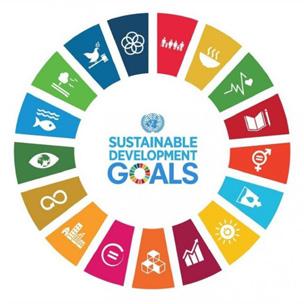
The Caribbean Disaster Emergency Management Agency (CDEMA) is a case in point at the regional level. CDEMA provides early warning mechanisms
Institutions play an important role in planning, implementing, and monitoring sustainable development. In the management of emergencies, disasters, and climate change effects, these institutions also contribute to resilience building. Caribbean small island developing States (SIDS), being highly susceptible to disasters and extreme weather events, the excessive human and economic costs that accrue to these countries from these occurrences are very well known.
allowing the member States to effectively prepare for different natural disasters and minimize their detrimental effects.12 CDEMA’s early warning capabilities contributed to the detection in late 2020 of La Soufrière volcano’s impending eruption in Sant Vincent and the Grenadines, which eventually erupted in April 2021. In close coordination with the CDEMA, the Government of Saint Vincent and the Grenadines effectively responded to this natural disaster. Close coordination with regional agencies, the media, and national authorities kept all stakeholders informed of the volcanos impending eruption.

In case of extreme weather events, the example of how Dominica manages its susceptibility is worth mentioning. The Government of Dominica created the Climate Resilience Execution Agency of Dominica (CREAD) following the devastation produced by Hurricane Maria, to enable the multi-stakeholder collaboration needed to surmount the challenges of more frequent and severe weather events.3 This agency’s task is to coordinate multiple ministries and regional organizations to implement the country’s Climate Resilience and Recovery Plan (CRPP), with a vision to make Dominica the first climate resilience country. Sharing this vision is the country’s National Resilient Development Strategy (NRDS), which aligns the SDGs with Dominica’s development priorities.
In terms of climate change, Belize is highly susceptible to adverse environmental effects produced by climate change. Therefore, coastal areas conservation, management, and sustainable development are vital for the country. Belize promulgated the Coastal Zone Management Act in 1998 to achieve the above goal. This Act established the Coastal Zone Management Authority and Institute (CZMAI) as the focal agency in planning and monitoring its coastal areas’ conservation and sustainable management.4 This agency collaborates with other governmental agencies and stakeholders to promote the Horizon 2030 National Development Framework, which is Belize’s overall mechanism for promoting and implementing the SDGs. The CZMAI channels information from local stakeholders of Belize’s coastal areas to effectively construct long-term coastal management plans that balance the need to conserve marine biodiversity with coastal development, fishing, and oil extraction.
Emergency response and management agencies are a set of institutions that play a crucial role in promoting, monitoring, and evaluating initiatives and regulations to advance sustainable development and contribute resilience building. Crucially, international cooperation increases the capacities and impacts of these agencies. International organizations play vital roles through technical assistance and capacity building, in enhancing the capabilities of these agencies. Regional
* Daniel Leon is an Associate Social Affairs Officer in the Statistics and Social Development Unit at the ECLAC Subregional Headquarters for the Caribbean.
1 Government of Dominica, National Resilience Development Strategy Dominica 2030. Roseau.
2 Caribbean Disaster Emergency Management Agency (2014), Regional Comprehensive Disaster Management (CDM) Strategy & Results Framework 2014-2024, St. Michael.
3 Government of Dominica, National Resilience Development Strategy Dominica 2030. Roseau.
4 Camarinhas, Catarina, and Ivica Trumbic. (2002), “A review of the status of institutional mechanisms for sustainable development planning in the Caribbean”, Studies and Perspectives series-ECLAC Subregional Headquarters for the Caribbean, No. 107 (LC/TS.2022/16-LC/ CAR/TS.2022/1), Santiago, Economic Commission for Latin America and the Caribbean (ECLAC).
organizations provide technical and material support, such as the provision of GIS data,5 through the multi-stakeholder cooperation, such as that between The University of the West Indies’ (UWI) Seismic Research Centre, Saint Vincent and the Grenadines National Emergency Management Organization, and the national disaster management offices of countries near the La Soufrière volcano. Such examples of international

technical assistance and capability building significantly strengthen national and regional agencies to promote and advance sustainable development in the Caribbean by making Member States more resilient to the impact of disasters and climate change.
Belize Integrated Coastal Zone Management Plan: scenarios for coastal development (2015)
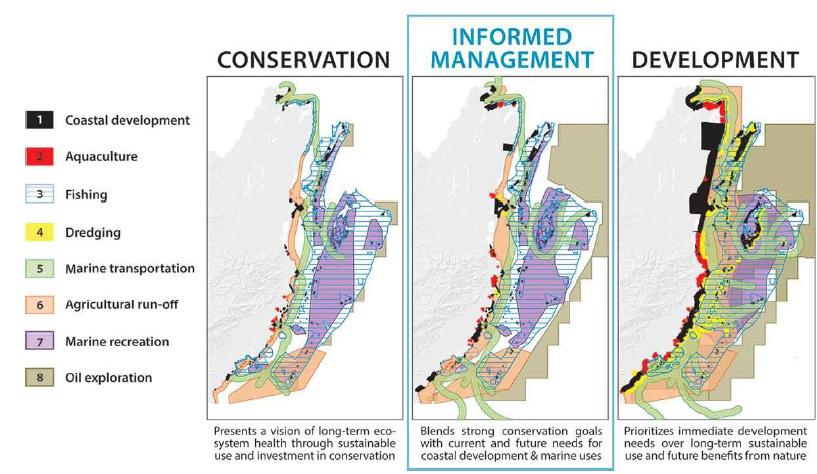
Source: Verutes et al. (2017).6
5 UN-GGIM Americas: http://www.un-ggim-americas.org and CARIGEO portal: https://www.caribbeangeoportal.com.
6 Verutes, Gregory M., Arkema, K. K., Clarke-Samuels, C., Wood, S. A., Rosenthal, A., Rosado, S., Canto, M., Bood, N., and M. Ruckelshaus (2017), “Integrated planning that safeguards ecosystems and balances multiple objectives in coastal Belize”, International Journal of Biodiversity Science, Ecosystem Services & Management, 13:3, 1-17.
For example, Antigua and Barbuda created a section in their VNR under each SDG titled, “Bright Spots, Success Stories and Opportunities”, in which the country presented several case studies that illustrate progress towards achieving a particular SDG. This provided the opportunity to showcase the work of non-state actors. For example, under SDG 1, No Poverty, The Home Advancement Programme for the Poor and Indigent was showcased. This programme, which started in 2016, focuses on repairing homes of indigent or poor households.
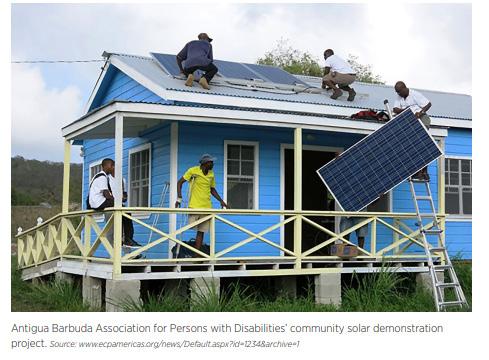

Also, under SDG 12, Responsible Consumption and Production, the work of several civil society organizations was highlighted. Focus was placed on waste management projects they are implementing that support the 3Rs of reduce, reuse, and recycle towards advancing a circular economy. The work of ZERO Waste Antigua Barbuda, a civil society organization involved in beach cleaning to protect the habitats of
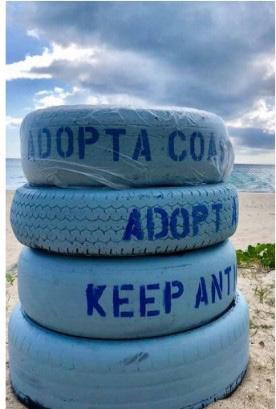
marine animals, turtles, and the islands’ ecosystems, was also highlighted in the country’s VNR. The organization is also involved in a National Mercury Management Program to phase down and phase out Mercury, as well as the recycling of metals.
Caribbean countries recognize that while notable progress has been made in advancing the sustainable development of the subregion, there is much left to be accomplished. Agenda 2030 provides a comprehensive opportunity to advance development around the five pillars (5Ps) – People, Planet, Prosperity, Peace, and Partnership. Caribbean countries are implementing several processes and measures to build a sustainable society through environmental sustainability, economic resilience and social improvements underpinned by good governance, and are fully committed to the task of advancing Agenda 2030 for the
benefit of current and future generations. Ultimately, the value of stakeholder engagement fully resonates with the subregion’s development pathways and its importance in development processes. Leveraging the benefits of consensus and shared visions towards creating development that is sustainable and equal, helps to ensure that no one is left behind on the path to a sustainable and resilience Caribbean.



PO Box 1113, Port of Spain, Trinidad and Tobago Tel: 868-224-8000 E-mail: eclac-spou-pos@eclac.org
vrb.al/eclaccaribbean
